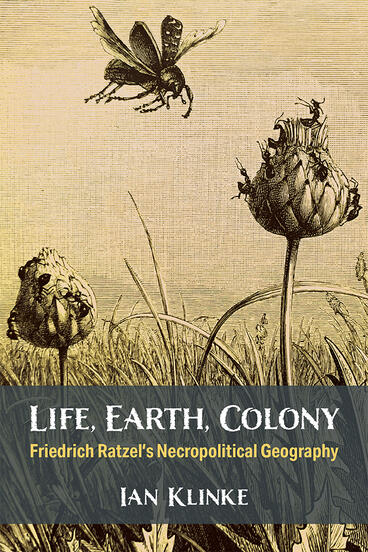Life, Earth, Colony
Friedrich Ratzel's Necropolitical Geography
A critical exploration of Friedrich Ratzel and the relationship between colonial and fascist necropolitics
Description
Life, Earth, Colony explores the ideas, life, and historical significance of German zoologist turned geographer Friedrich Ratzel (1844–1904), famous for developing the foundations of geopolitical thought. Ratzel produced a remarkable body of work that revolutionized the study of space, movement, colonization, and war. He also served as a source of intellectual inspiration for national socialism, particularly through his Lebensraum (living space) concept, which understood all life as being caught in an eternal struggle for space. This book closely analyzes this radical conservative intellectual, focusing on his often-overlooked ethnography, biogeography, travel, and creative writing, and colonial activism as well as his more widely-known political geography.
Life, Earth, Colony finds that there is an as yet unexplored necropolitical impulse at the heart of Ratzel’s entire oeuvre, a preoccupation with death and dying, which had a profound impact on twentieth-century history.
Ian Klinke is Associate Professor in Human Geography at the University of Oxford.
Reviews
“Ian Klinke has written the Ratzel biography we have been waiting for. Skillfully blending biography, conceptual history, and political theory, Klinke provides a critically minded account of one of the most fascinating intellectuals of the imperial age. He uncovers the cosmopolitan liberal progressive who admired US settler colonialism, the theorist of civilization preoccupied with extermination and death, the academic who unwittingly forged a vocabulary for fascism. Written in wonderful prose, the result is a compelling study that will endure.”
- Gerard Toal
—Gerard Toal, Virgina Tech
“Friedrich Ratzel was an equally influential and contradictory scientist of the nineteenth century: political geographer, convinced racist, and a dreamy critic of substance dualism. Ian Klinke succeeds in locating the Leipzig geographer in his scientific and political context in a way that is both remarkably readable and intellectually outstanding. The book balances elegantly between Ratzel’s life-historical background, his colonial political agitation and academic research—the result is an excellent intellectual biography that undoubtedly sets high standards.”
- Ulrike Jureit
—Ulrike Jureit, Hamburger Institut für Sozialforschung
“Ian Klike’s Life, Earth, Colony is an outstanding achievement. While the significance of the geographer Friedrich Ratzel for discourses of imperial expansion and settler colonialism in Wilhelmine Germany has been increasingly noted in recent historiography, Klinke is the first to unpack these issues in their full complexity. By training a zoologist, Ratzel offered a naturalist perspective in which expansion and colonization were projected as inherent processes of the natural world, as typical (and by implication as legitimate) for arctic lichens and ant communities as they were for European societies in the nineteenth century. Klinke argues that this biologism, which culminated in the concept of Lebensraum, was shaped by necropolitics, a preoccupation with death and decay in which ‘biology, race, and sovereignty were fundamentally fused.’ Informative and provocative in equal measure, Klinke’s study will be of great value to all those interested in ideologies of European colonialism, the development of ecological theory, and the origins of Geopolitik.”
- Mark Bassin
—Mark Bassin, Södertörn University

